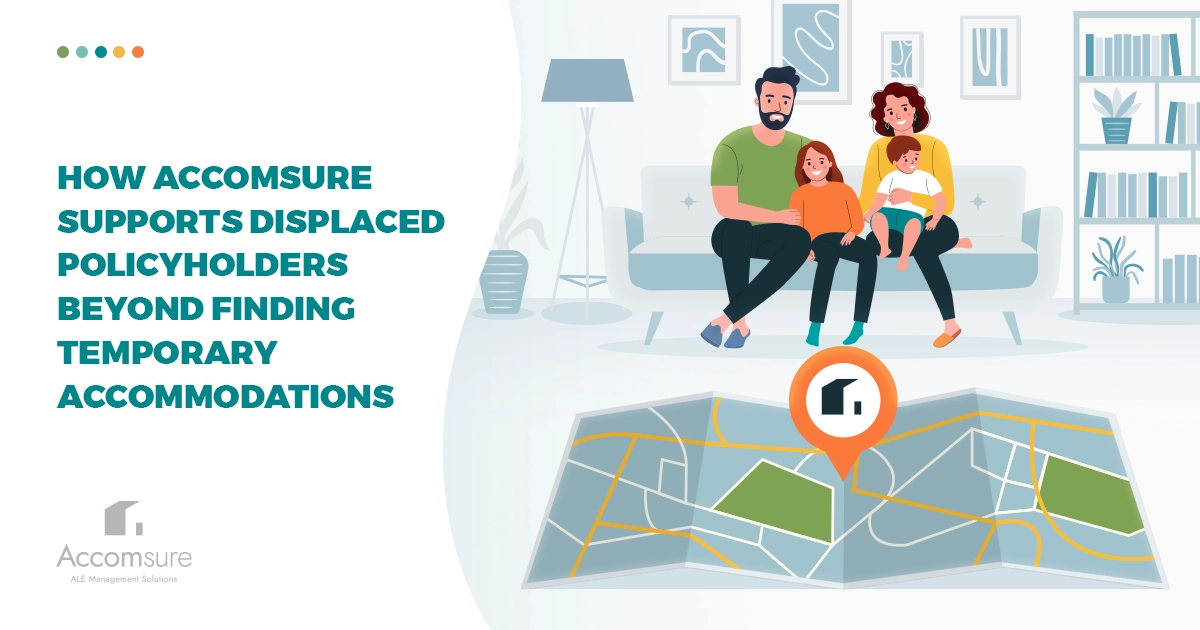After a house fire, flood, or other disaster causes displacement, policyholders need a safe and comfortable place to stay.
However, it’s not as easy as going to the nearest hotel or available property and staying there until the home is rebuilt. Displaced policyholders need temporary accommodations of like kind and quality that meet their specific and unique living requirements.
For example, someone with mobility difficulties may require wheelchair-accessible housing or a family with pets needs a fenced-in yard.
It’s important that displaced policyholders find temporary housing that meets their diverse needs to ensure their comfort, safety, and well-being during this difficult time.
In this blog post, we’re covering the unique temporary housing needs of different policyholders throughout Canada. Keep reading so you can be better equipped to support any policyholder with temporary housing support should displacement occur.
1. Seniors
In 2023, 7,568,308 individuals in Canada were 65 years and older. This growing demographic often has unique needs when displaced, especially if they have mobility issues or medical conditions.
Some of these temporary housing needs for senior policyholders may include:
- A bungalow-style home or ground-floor unit
- Bathrooms with grab bars or walk-in showers
- Accessible and wider doorways for wheelchairs or walkers
- Quiet, more peaceful environments
- Close proximity to doctors or home care services
Ensuring seniors temporarily live in accessible and comfortable environments improves their quality of life and helps reduce the risk of injury or medical complications during displacement.
2. Families with Children

When families with children need temporary housing, there are specific criteria they have to consider that may not apply to single individuals or couples, such as:
- Having adequate bedrooms similar to their insured dwelling, so there are separate sleeping areas for parents and children
- Being close to the children’s school and/or daycare
- Having safe, enclosed outdoor spaces for children to play
- Having access to amenities like laundry facilities and parks
Displacement is already an incredibly stressful experience; when parents are stressed, that tension often affects the whole family. Finding temporary housing with a home-like atmosphere makes parents and children feel less anxious and more secure.
3. Pregnant Women
Stress during pregnancy can have a significant impact on both the mother and the baby. That’s why it’s crucial to know the specific needs pregnant women may have with their temporary accommodations to ensure a safe and comfortable environment. Some of these criteria may include:
- Remaining close to the primary neighbourhood to ensure proximity to healthcare facilities for prenatal care and emergency services
- Ground-floor units or limited stairs to reduce physical strain
- Quiet, peaceful environments to support rest and relaxation
- Easily accessible bathrooms and kitchens with non-slip flooring for safety
4. People with Chronic Illnesses
Those living with chronic illnesses often have medical equipment, or they may require a home located close to their doctor or healthcare facility.
Additionally, individuals with chronic illnesses may have heightened susceptibility to certain environmental factors, such as allergens or accessibility issues.
The following are some housing needs people with chronic illnesses may require to live comfortably in their temporary home:
- Remaining close to the primary neighbourhood to ensure proximity to doctors for regular treatments and medications
- Clean, allergen-free and pet-free environments with good ventilation and air filtration systems
- Access to an abundance of electricity for medical equipment like oxygen tanks or dialysis machines
- Quiet and restful spaces to manage symptoms and ensure recovery
- Accessible bathrooms and bedrooms
5. Low-Income Families and Individuals
For low-income policyholders, the financial stress they already face can be significantly worsened when they are displaced from their homes.
When already struggling to afford food, utilities, and other basic necessities, being displaced can push them further into financial instability and make it even more challenging to meet their essential needs.
By helping low-income families find temporary accommodations that meet their current lifestyle, you can reduce their stress and financial burden.
Here are some requirements low-income families and individuals may have when finding temporary accommodations:
- Affordable rent or housing costs that fit within insurance or assistance limits
- Proximity to public transportation for easy access to work, schools, and services
- Kitchen space to make meals at home rather than going out for food
6. ESL (English as a Second Language) Individuals
In 2023, 471,771 immigrants moved to Canada from various countries around the world. Additionally, around 4.6 million Canadians primarily speak a language other than English or French.
Policyholders who do not speak fluent English may face additional stress during displacement, as they may struggle to communicate their housing needs or understand the in-depth terms of their insurance policy.
When finding temporary housing for those who speak English as a second language, consider accommodations near workplaces, in their primary neighbourhood, or near their family or friends. This can help them maintain a sense of belonging and comfort, which is particularly important during displacement.
7. Families with Pets

For many households, pets are considered family members, and finding temporary housing that allows animals is often non-negotiable. However, pet-friendly accommodations can be more difficult to find.
The following are a few housing needs families with pets may require to live comfortably in their temporary home:
- A fenced yard
- Pet-friendly flooring such as tile or laminate to avoid damage
- Ample indoor space for pets to move around comfortably
- Nearby pet-friendly walking trails or green spaces
- Easy access to pet stores for food and other supplies
Lean on Accomsure for Temporary Housing Support
At Accomsure, we recognize the weight of your responsibilities when supporting displaced policyholders.
That’s why we’re here to support you and your policyholders.
Accomsure is equipped to help all policyholders, no matter their unique circumstances, find temporary housing that meets their needs while ensuring indemnity control.
Our extensive network of housing providers allows us to find a temporary home that feels like a home-away-from-home to reduce stress and anxiety.
Submit a claim or contact Accomsure to learn more about how we can find secure, cost-effective housing that meets policyholders’ needs while fitting within claim limits.




